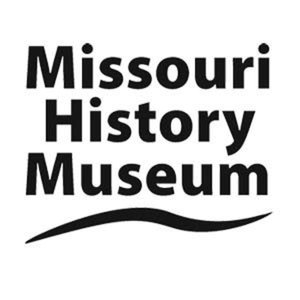from Apr. 19, 1865
Journal – DC Journal Sunday April 16 to Friday 21
-
Full Title
Journal – DC Journal Sunday April 16 to Friday 21
-
Description
Pages of a journal dating from Sunday, April 16, 1865, to Friday, April 21, 1865. Most of the entries are blank. The Wednesday, April 19, 1865, entry notes that “President Lincoln was carried to the Capitol to day” and discusses the procession.
-
Transcription
WEDNESDAY, APRIL 19, 1865.
President Lincoln was
carried to the Capitol to day
the procession was very large
probably 10,000 persons in it and
many more on the streets
THURSDAY 20
[[No Notes]]
FRIDAY 21
[[No Notes]]
[Transcription team: Jaeger K., Gabriel Z., Dwight S.]
[New Hampton Middle School, New Hampton, Iowa]
-
Source
Tucker Collection care of Museum of the Grand Prairie
-
Rights
Use of this item for research, teaching and private study is permitted with proper citation and attribution to the Museum of the Grand Prairie, Champaign County Forest Preserve District. Reproduction of this item for publication, broadcast, or commercial use requires written permission. For permission please contact Museum of the Grand Prairie, Champaign County Forest Preserve District.
-
Tags
-
Cite this Item
Unknown. "Journal – DC Journal Sunday April 16 to Friday 21". Remembering Lincoln. Web. Accessed July 7, 2025. https://rememberinglincoln.fords.org/node/399
from Apr. 19, 1865
Journal – DC Journal Sunday April 16 to Friday 21
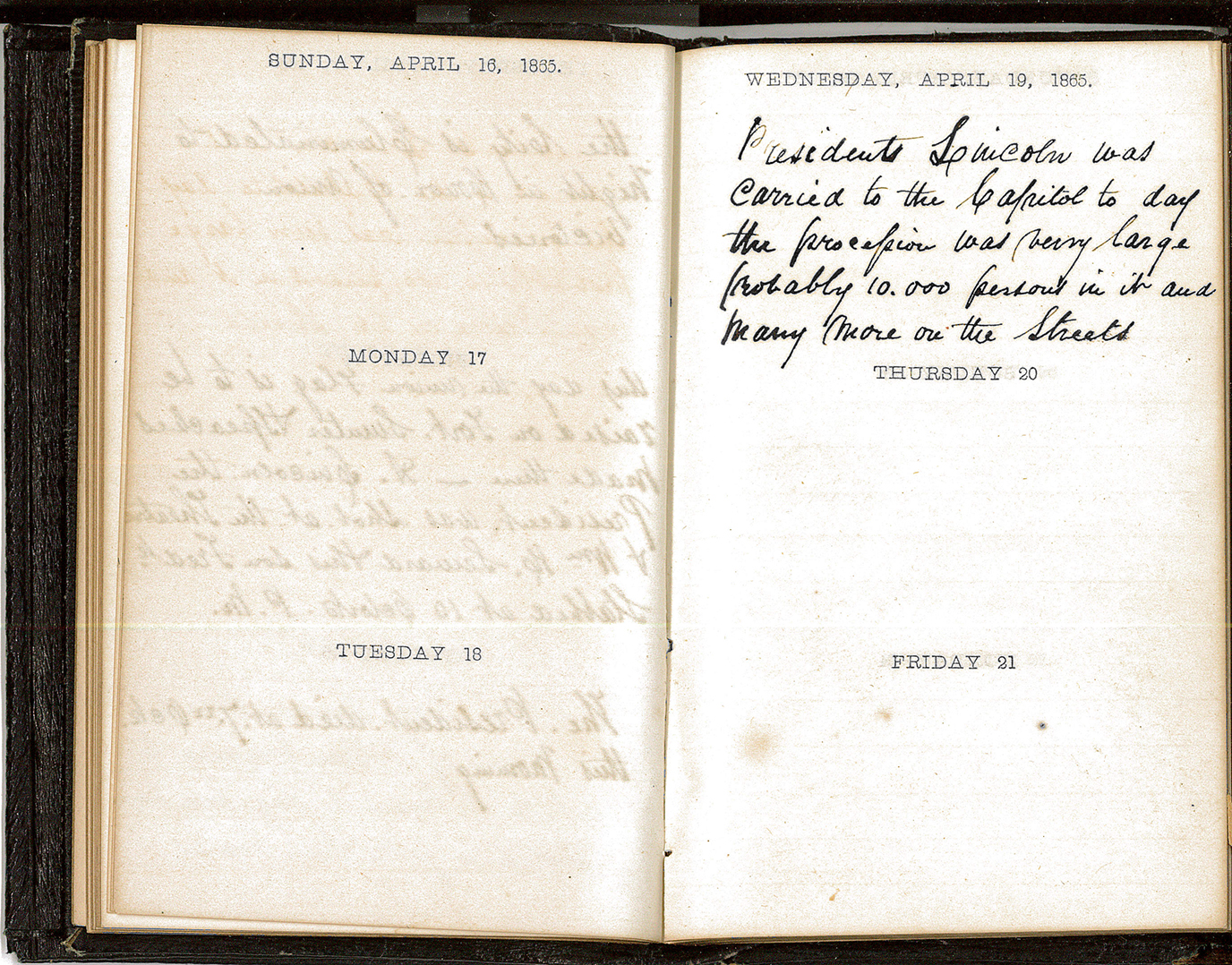
-
Description
Pages of a journal dating from Sunday, April 16, 1865, to Friday, April 21, 1865. Most of the entries are blank. The Wednesday, April 19, 1865, entry notes that “President Lincoln was carried to the Capitol to day” and discusses the procession.
-
Source
Tucker Collection care of Museum of the Grand Prairie
-
Rights
Use of this item for research, teaching and private study is permitted with proper citation and attribution to the Museum of the Grand Prairie, Champaign County Forest Preserve District. Reproduction of this item for publication, broadcast, or commercial use requires written permission. For permission please contact Museum of the Grand Prairie, Champaign County Forest Preserve District.
-
Creator
Unknown
-
Date
April 19, 1865
from Apr. 13, 1865
Anonymous Diary
-
Full Title
Journal – DC Journal Monday April 10 1865
-
Description
The journal contains entries from Thursday, April 13,1865, to Saturday, April 15, 1865, recounting the happenings around the District of Columbia. The author cites the illumination of the city in honor of Union victories. On the 14th it notes that Lincoln was shot and Seward was stabbed. The 15th notes Lincolns death at 7:22.
-
Source
Tucker Collection care of Museum of the Grand Prairie
-
Rights
Use of this item for research, teaching and private study is permitted with proper citation and attribution to the Museum of the Grand Prairie, Champaign County Forest Preserve District. Reproduction of this item for publication, broadcast, or commercial use requires written permission. For permission please contact Museum of the Grand Prairie, Champaign County Forest Preserve District.
-
Tags
-
Cite this Item
Unknown. "Journal – DC Journal Monday April 10 1865". Remembering Lincoln. Web. Accessed July 7, 2025. https://rememberinglincoln.fords.org/node/398
from Apr. 13, 1865
Journal – DC Journal Monday April 10 1865
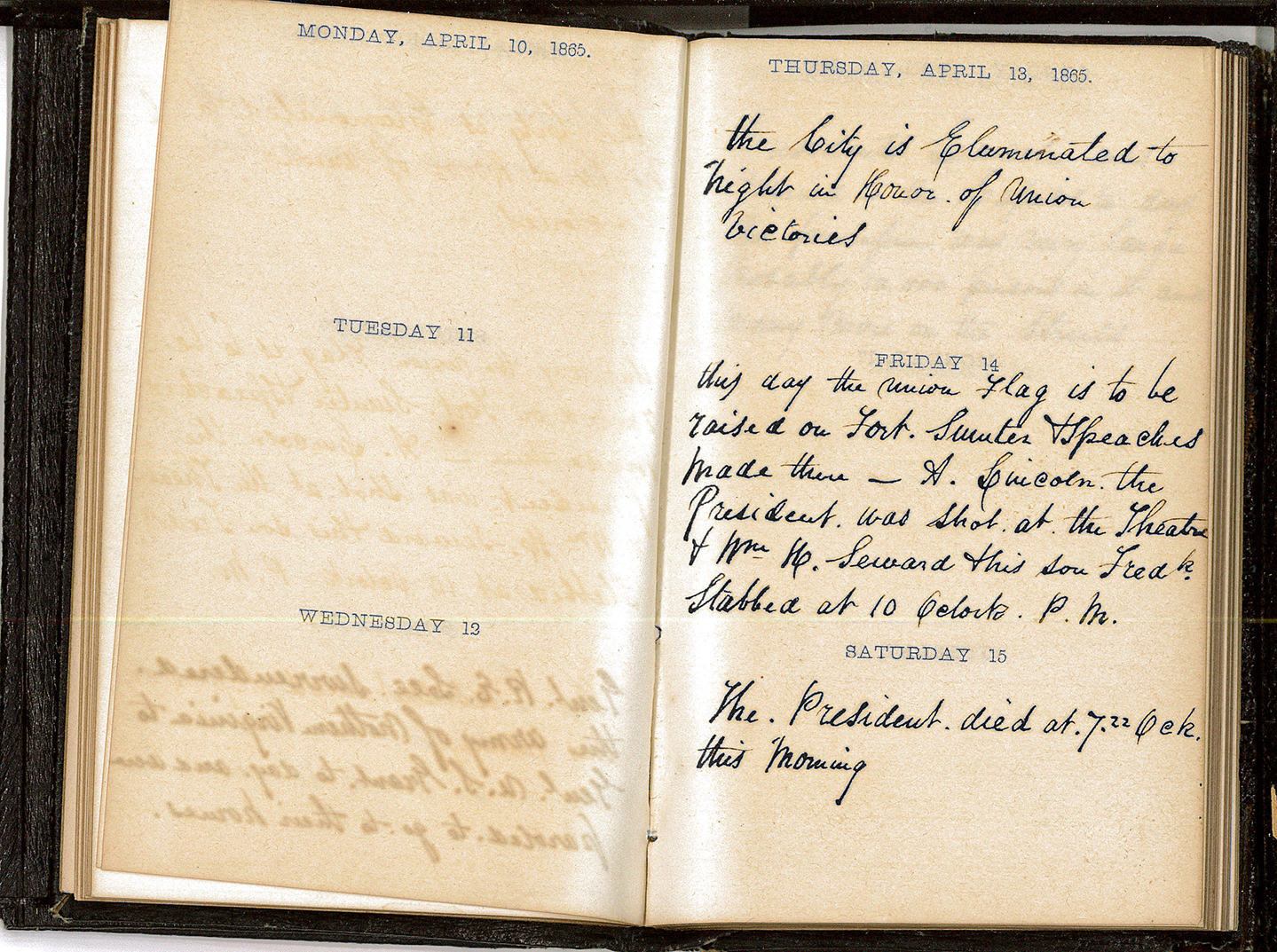
-
Description
The journal contains entries from Thursday, April 13,1865, to Saturday, April 15, 1865, recounting the happenings around the District of Columbia. The author cites the illumination of the city in honor of Union victories. On the 14th it notes that Lincoln was shot and Seward was stabbed. The 15th notes Lincolns death at 7:22.
-
Source
Tucker Collection care of Museum of the Grand Prairie
-
Rights
Use of this item for research, teaching and private study is permitted with proper citation and attribution to the Museum of the Grand Prairie, Champaign County Forest Preserve District. Reproduction of this item for publication, broadcast, or commercial use requires written permission. For permission please contact Museum of the Grand Prairie, Champaign County Forest Preserve District.
-
Creator
Unknown
-
Date
April 13, 1865
from Apr. 16, 1865
Anonymous Diary
-
Full Title
Journal – April Thursday 13 to Sunday 16 1865
-
Description
This diary contains journal entries from Thursday, April 13, 1865, through Sunday , April 16th, 1865. April 15th, the author notes that they heard of the death of the President and “also of Seward”. On the 16th the journalist talks about going to church and the “calamity” that has happened to the Nation.
-
Source
Tucker Collection care of Museum of the Grand Prairie
-
Rights
Use of this item for research, teaching and private study is permitted with proper citation and attribution to the Museum of the Grand Prairie, Champaign County Forest Preserve District. Reproduction of this item for publication, broadcast, or commercial use requires written permission. For permission please contact Museum of the Grand Prairie, Champaign County Forest Preserve District.
-
Tags
-
Cite this Item
Unknown. "Journal – April Thursday 13 to Sunday 16 1865". Remembering Lincoln. Web. Accessed July 7, 2025. https://rememberinglincoln.fords.org/node/397
from Apr. 16, 1865
Journal – April Thursday 13 to Sunday 16 1865
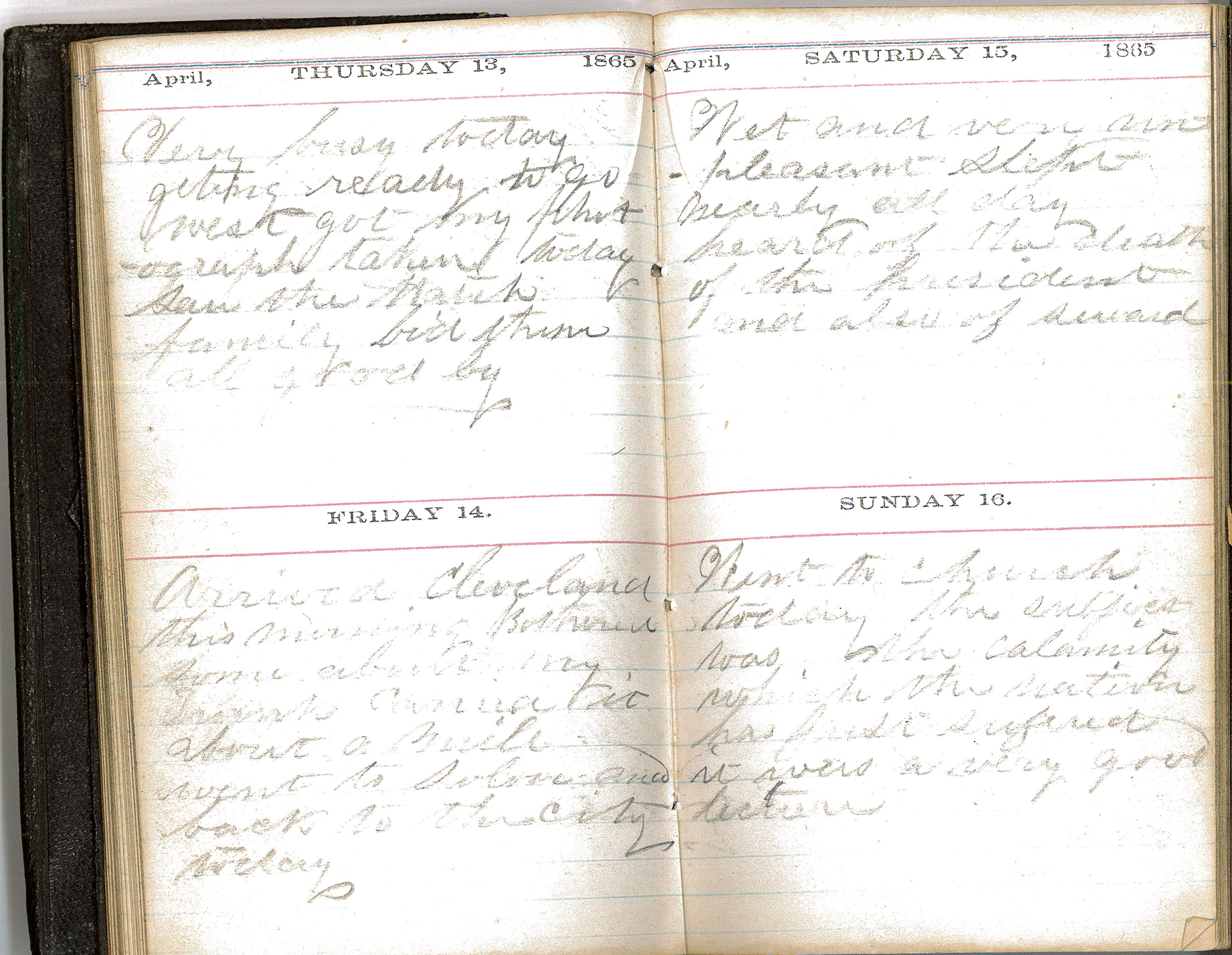
-
Description
This diary contains journal entries from Thursday, April 13, 1865, through Sunday , April 16th, 1865. April 15th, the author notes that they heard of the death of the President and “also of Seward”. On the 16th the journalist talks about going to church and the “calamity” that has happened to the Nation.
-
Source
Tucker Collection care of Museum of the Grand Prairie
-
Rights
Use of this item for research, teaching and private study is permitted with proper citation and attribution to the Museum of the Grand Prairie, Champaign County Forest Preserve District. Reproduction of this item for publication, broadcast, or commercial use requires written permission. For permission please contact Museum of the Grand Prairie, Champaign County Forest Preserve District.
-
Creator
Unknown
-
Date
April 16, 1865
from Apr. 16, 1865
Otis Keene Diary, April 16-18, 1865
-
Full Title
Otis Keene Diary, April 16-18, 1865
-
Description
Manuscript item from “Pioneer Days in Florida,” the Otis Keene diary of 1865, April 16-18, which reported the assassination, the funeral procession, the hunt for Booth, etc. Diary, correspondence. These diaries (1863-1894, 1903-1910) contain Keene's often terse entries about his daily routines from 1863, when he resided in Washington, D.C., through his years as a citizen of Jacksonville, Florida. They include his reaction to the assassination of President Abraham Lincoln. Unfortunately, the diaries do not cover the crucial Florida years of 1898 (Spanish-American War) and 1901 (Great Jacksonville Fire) but remain important as a local chronicle.
-
Source
University of Florida
-
Rights
This item is presumed to be in the public domain. The University of Florida George A. Smathers Libraries respect the intellectual property rights of others and do not claim any copyright interest in this item. Users of this work have responsibility for determining copyright status prior to reusing, publishing or reproducing this item for purposes other than what is allowed by fair use or other copyright exemptions. Any reuse of this item in excess of fair use or other copyright exemptions may require permission of the copyright holder. The Smathers Libraries would like to learn more about this item and invite individuals or organizations to contact Digital Services (UFDC@uflib.ufl.edu) with any additional information they can provide.
-
Tags
-
Cite this Item
Keene, Otis L., 1830-. "Otis Keene Diary, April 16-18, 1865". Remembering Lincoln. Web. Accessed July 7, 2025. https://rememberinglincoln.fords.org/node/376
from Apr. 16, 1865
Otis Keene Diary, April 16-18, 1865
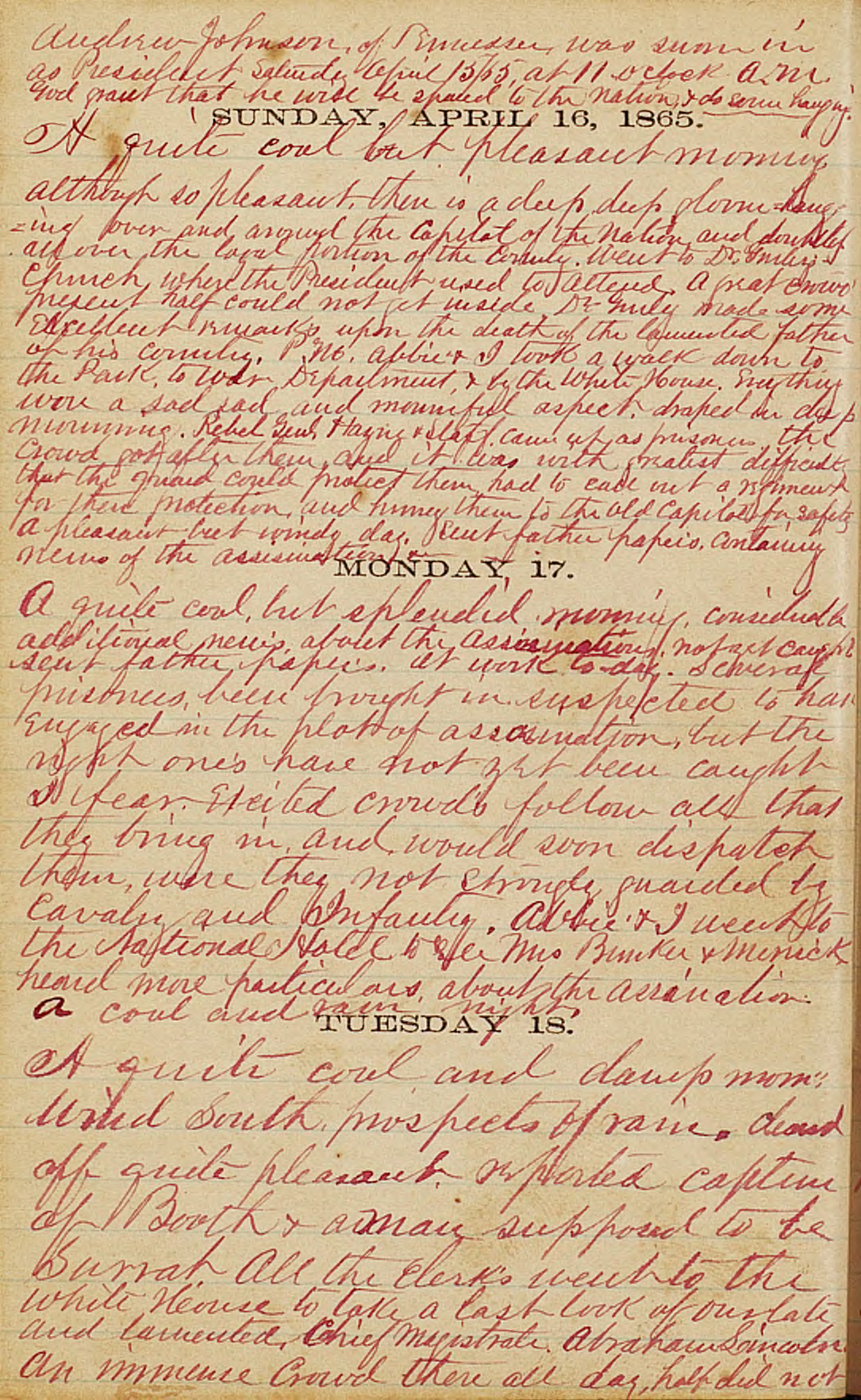
-
Description
Manuscript item from “Pioneer Days in Florida,” the Otis Keene diary of 1865, April 16-18, which reported the assassination, the funeral procession, the hunt for Booth, etc. Diary, correspondence. These diaries (1863-1894, 1903-1910) contain Keene's often terse entries about his daily routines from 1863, when he resided in Washington, D.C., through his years as a citizen of Jacksonville, Florida. They include his reaction to the assassination of President Abraham Lincoln. Unfortunately, the diaries do not cover the crucial Florida years of 1898 (Spanish-American War) and 1901 (Great Jacksonville Fire) but remain important as a local chronicle.
-
Source
University of Florida
-
Rights
This item is presumed to be in the public domain. The University of Florida George A. Smathers Libraries respect the intellectual property rights of others and do not claim any copyright interest in this item. Users of this work have responsibility for determining copyright status prior to reusing, publishing or reproducing this item for purposes other than what is allowed by fair use or other copyright exemptions. Any reuse of this item in excess of fair use or other copyright exemptions may require permission of the copyright holder. The Smathers Libraries would like to learn more about this item and invite individuals or organizations to contact Digital Services (UFDC@uflib.ufl.edu) with any additional information they can provide.
-
Creator
Keene, Otis L., 1830-
-
Date
April 16, 1865
-
Material
Diary
from Apr. 15, 1865
Otis Keene Diary, April 15, 1865
-
Full Title
Otis Keene Diary, April 15, 1865
-
Description
Manuscript item from “Pioneer Days in Florida,” the Otis Keene diary of 1865, April 15 to April 27, which reported the assassination, the funeral procession, the hunt for Booth, etc. Diary, correspondence. These diaries (1863-1894, 1903-1910) contain Keene's often terse entries about his daily routines from 1863, when he resided in Washington, D.C., through his years as a citizen of Jacksonville, Florida. They include his reaction to the assassination of President Abraham Lincoln. Unfortunately, the diaries do not cover the crucial Florida years of 1898 (Spanish-American War) and 1901 (Great Jacksonville Fire) but remain important as a local chronicle.
-
Source
University of Florida
-
Rights
This item is presumed to be in the public domain. The University of Florida George A. Smathers Libraries respect the intellectual property rights of others and do not claim any copyright interest in this item. Users of this work have responsibility for determining copyright status prior to reusing, publishing or reproducing this item for purposes other than what is allowed by fair use or other copyright exemptions. Any reuse of this item in excess of fair use or other copyright exemptions may require permission of the copyright holder. The Smathers Libraries would like to learn more about this item and invite individuals or organizations to contact Digital Services (UFDC@uflib.ufl.edu) with any additional information they can provide.
-
Tags
-
Cite this Item
Keene, Otis L., 1830-. "Otis Keene Diary, April 15, 1865". Remembering Lincoln. Web. Accessed July 7, 2025. https://rememberinglincoln.fords.org/node/373
from Apr. 15, 1865
Otis Keene Diary, April 15, 1865

-
Description
Manuscript item from “Pioneer Days in Florida,” the Otis Keene diary of 1865, April 15 to April 27, which reported the assassination, the funeral procession, the hunt for Booth, etc. Diary, correspondence. These diaries (1863-1894, 1903-1910) contain Keene's often terse entries about his daily routines from 1863, when he resided in Washington, D.C., through his years as a citizen of Jacksonville, Florida. They include his reaction to the assassination of President Abraham Lincoln. Unfortunately, the diaries do not cover the crucial Florida years of 1898 (Spanish-American War) and 1901 (Great Jacksonville Fire) but remain important as a local chronicle.
-
Source
University of Florida
-
Rights
This item is presumed to be in the public domain. The University of Florida George A. Smathers Libraries respect the intellectual property rights of others and do not claim any copyright interest in this item. Users of this work have responsibility for determining copyright status prior to reusing, publishing or reproducing this item for purposes other than what is allowed by fair use or other copyright exemptions. Any reuse of this item in excess of fair use or other copyright exemptions may require permission of the copyright holder. The Smathers Libraries would like to learn more about this item and invite individuals or organizations to contact Digital Services (UFDC@uflib.ufl.edu) with any additional information they can provide.
-
Creator
Keene, Otis L., 1830-
-
Date
April 15, 1865
-
Material
Diary
from Apr. 19, 1865
Johannes Oertel Diary
-
Full Title
Johannes Oertel Diary
-
Description
Johannes Oertel, a minister who later became an artist, wrote about his feelings on the assassination of President Abraham Lincoln five days before.
-
Transcription
Wednesday, April 19, 1865
Most memorable day! A day of mourning and lamentation! A continent in tears! The Nation weeping, and her foes dismayed and fleeing in disguise and terror! This cursed rebellion has culminated its gigantic atrocities in the foul murder of our great, good, beloved President. The hand of a vile assassin extinguished his precious life last Friday evening, and today over twenty millions of people mourn after his hearse, and swear over his grave by High Heaven a solemn, determined oath, that the black wickedness, which has for four bloody years made our beautiful country old in deeds of carnage and violence, shall be utterly wiped out of existence, and evenhanded Justice have her uninterrupted work with the leaders, who caused such widespread misery.
As the dreadful news of the assassination of Mr. Abr. Lincoln flashed over the thousands of miles of this continent, the nation received a paralysis shock indeed. A feeling of horror and deep gloom spread over the land, and men were struck dumb with awe. All fealt the fearful calamity and felt the national bereavement. We have lost a Father! A great man has fallen. For four years, with a far-seeing, calm and clear mind, steady and unwavering in high principle and sterling integrity, with the purest patriotism and self-sacrifice, an all-embracing love and tender care, patient and untouched by censure or calumny, looking with devout faith and childlike trust to the end, as a merciful Providence would surely protect the right and bring it to victory, he has guided his distressed county in her greatest dangers and perils, has firmly established the principle of universal freedom, subdued the power of her enemies, and raised again, our proud banner upon the ruined walls of that very fortress whence treason struck it down just four years before, and now that the future rose up before his gratified vision, radiant with glory and happiness and strength, and his herkulean labors found a sweet reward, malicious hatred cut him off in the height of his usefulness. The hellish spirit of slavery and treason has done its perfect work--but it has struck the death blow at its own black heart. If there has existed any tendency to forget the depth of its heinous wickedness and to be easy with those men who led in treason and infamy, that tendency has vanished. There never was a more sudden revolution of feeling in the common mind of a whole great nation, as has been effected by the assassination of our lamented President. Treason could have done nothing so destructive of its own ends, so suicidal to its own existence. Both at home and with the whole civilized world it stands now utterly and forever condemned. It has fully revealed its true character, and the reckless, godless barbarity which has indeed marked the conduct of the South throughout this war, the outgrowth and legitimate consequence of that revolting inhuman system of slavery. But thank God! Henceforth our flag must wave over a country undivided and free, where no cruel lash drives a human chattel to their unwilling work; where no being created immortal and redeemed by the blood of Jesus Christ is bought and bartered away for money; where no wanton outrage can under the sanction of law trample under foot the ties of marriage and family relations; where education can no more be made a penal offence; where life is held sacred; where a man can travel from Maine to Florida and to the far Pacific without carrying revolver and knife; where, within the bounds of reason and law, he can utter his sentiments without fear and restraint; where on every foot of it he can truly feel that it is his fatherland, belonging to him and every citizen from one end to the other throughout its vast extent; where he has the right of a freeman, the protection of the law, the consciousness of security, and a just pride in a great country and a superior form of government, that has stood the fiery trial of an unparalleled insurrection most victoriously and approved itself more worthy of the confidence of all mankind, and the respect of foreign powers, than ever before it was so severely tried.
And to this end President Abraham Lincoln has contributed more than any other man. Be has established freedom, and has died its martyr. He lived for a great, noble principle, and died for it. His death is the seal of Liberty. Be is our Martyr-President. The grateful heart of the nation will hold his name most dear and all future history will call him the Great and the Good. His name is enshrined in sacred memory in the hearts of the poor, the oppressed, and down-trodden, whose father and liberator he emphatically has been, and wherever and whenever, the crushing out of the system of human slavery upon the soil of these United States is mentioned, by word or print, there will be associated with it inseperably and most favorably the venerated, beloved name of Abraham · Lincoln, the great Liberator, and martyr of freedom!
The Nation has prayed to day, and is praying, that the mercyful and almighty God, our ruler and our guide may impart wisdom, and strength, and firmness to his successor, Mr. Andrew Johnson, and make him a willing and fit instrument in His Land to do His heavenly will, and lead this people through the mazes of difficulties which yet surround us on every side, to peace, and justice, and happiness, in the fear of God, to His honor and glory, Amen.
-
Source
The Leo Pascal Collection
-
Rights
This item may be reproduced and used for any purpose, including research, teaching, private study, publication, broadcast or commercial use, with proper citation and attribution.
-
Tags
-
Cite this Item
Johannes Oertel. "Johannes Oertel Diary". Remembering Lincoln. Web. Accessed July 7, 2025. https://rememberinglincoln.fords.org/node/365
-
Creator
Johannes Oertel
-
Date
April 19, 1865
from Apr. 19, 1865
Johannes Oertel Diary
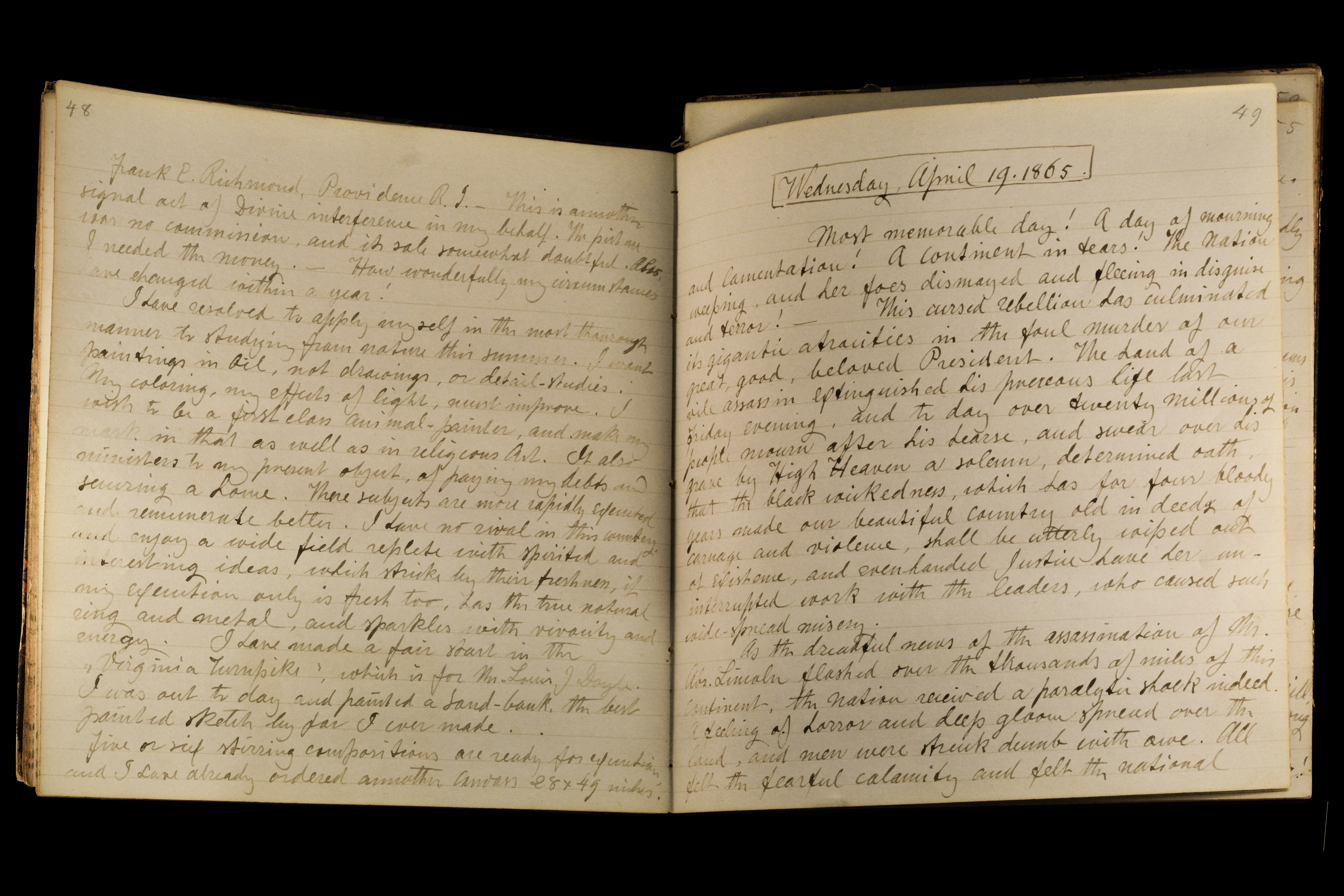
-
Description
Johannes Oertel, a minister who later became an artist, wrote about his feelings on the assassination of President Abraham Lincoln five days before.
-
Source
The Leo Pascal Collection
-
Rights
This item may be reproduced and used for any purpose, including research, teaching, private study, publication, broadcast or commercial use, with proper citation and attribution.
-
Creator
Johannes Oertel
-
Date
April 19, 1865
from Apr. 15, 1865
William B. Napton Diary
-
Full Title
Diary of William B. Napton, February 6, 1863-May 18, 1868
-
Source
Missouri History Museum
-
Rights
This item is in the public domain.
-
Tags
-
Cite this Item
Napton, William Barclay, 1808-1883. "Diary of William B. Napton, February 6, 1863-May 18, 1868". Remembering Lincoln. Web. Accessed July 7, 2025. https://rememberinglincoln.fords.org/node/316
from Apr. 15, 1865
Diary of William B. Napton, February 6, 1863-May 18, 1868
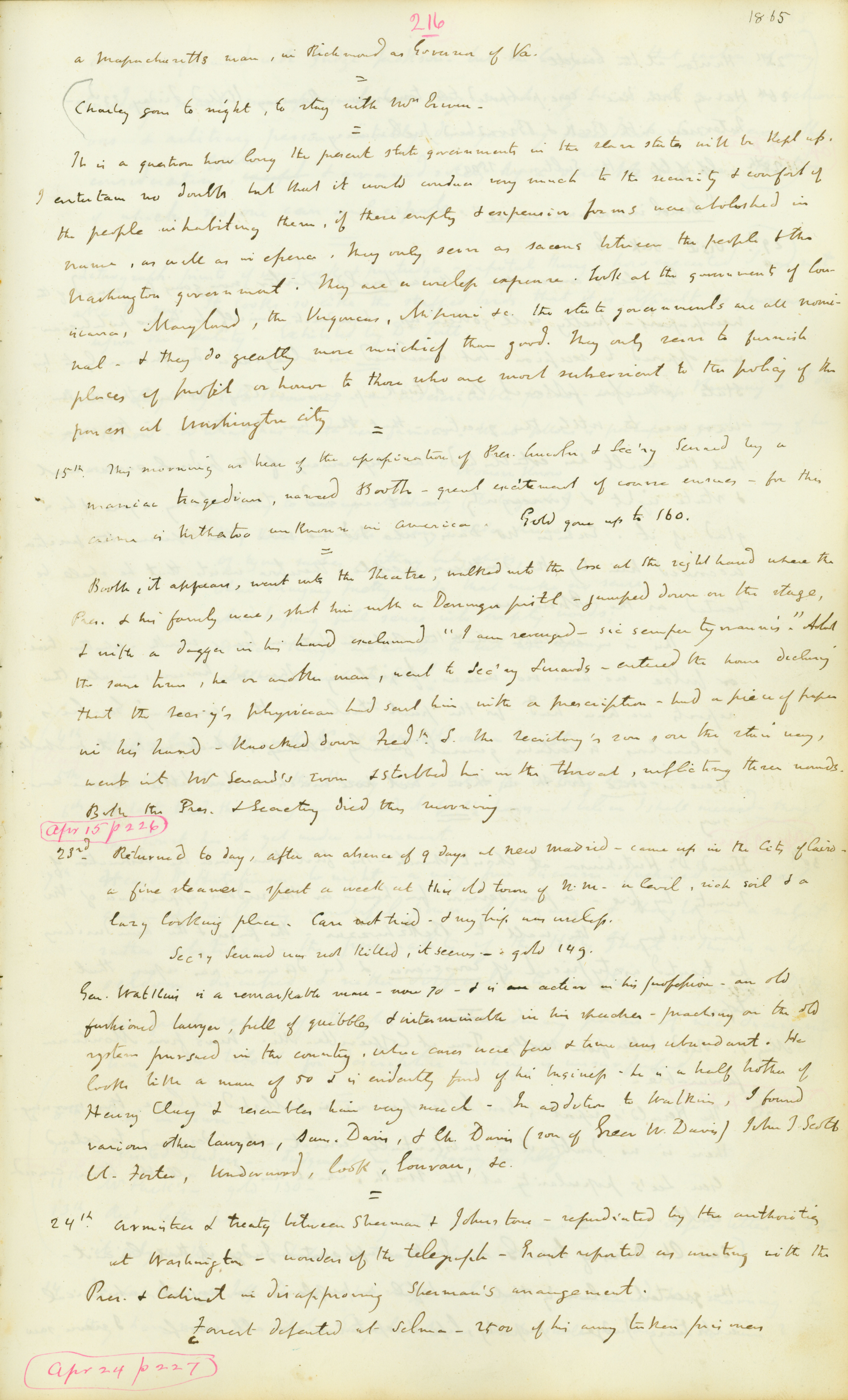
-
Source
Missouri History Museum
-
Rights
This item is in the public domain.
-
Creator
Napton, William Barclay, 1808-1883
-
Date
April 15, 1865
from Apr. 15, 1865
Diary of William Ellis Stork, Volume 1, Preston, Minnesota
-
Full Title
Diary of William Ellis Stork, Volume 1, Preston, Minnesota
-
Description
Diary of William Ellis Stork as he recounts his life and his reactions to major events.
-
Transcription
"Got news of Lincoln’s death and the attempted assassination of Sen [??]" (pg. 30)
"1865 April 3. Richmond & Peters burg was evacuated by the rebels & taken possession of by our forces April 9th and 10th Gen[eral] Lee surrendered the army of north Virginia to Grant Lincoln died was shot at a Theatre April 14th & died April 15th. Born July 12th 1809 Age at death death 55 y[ea]rs 9 m[onths] 3 d[ays] 16 m[inutes] President of the United States [inked line] Andrew Johnson took the oath of office as President April 15th at 11 o’clock A.M. [inked line] J. Wilkes Booth & his accomplice Harrold the murderers of President Lincoln was found in a barn at a Mr Garrotts 3 Ms[miles] from Bowling Green towards Port Royal in Virginia Booth was shot in the barn & died at 7 A.M. April 26th Harrold was taken to Washington President Johnson in his Proclamation of May 2nd after stating It appears from evidence in the burden[?] of military justice that the atrocious murder of the late President & attempted murder of W[illiam] H. Seward secretary of State incited, concerted, of & between Jefferson Davis late of Richmond Va[Virginia] & Jacob Thompson Clement Clay Beverly Tucker George N. Danders W.C. Cleary & others rebels & traitors against the Government of the United States, Harbored in Canada now therefore to the end" (pg. 74)
-
Source
Minnesota Reflections
-
Rights
Use of this item for research, teaching, and private study is permitted with proper citation and attribution. Reproduction of this item for publication, broadcast, or commercial use requires written permission.
-
Tags
-
Cite this Item
Stork, William Ellis, 1841 - 1938. "Diary of William Ellis Stork, Volume 1, Preston, Minnesota". Remembering Lincoln. Web. Accessed July 7, 2025. https://rememberinglincoln.fords.org/node/319
from Apr. 15, 1865
Diary of William Ellis Stork, Volume 1, Preston, Minnesota
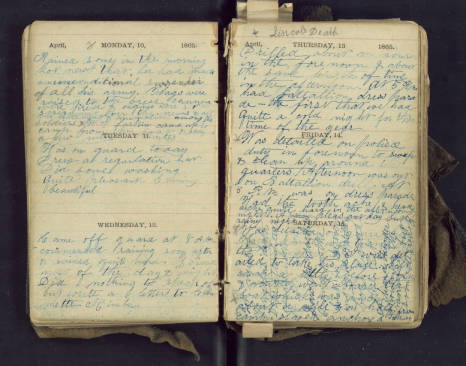
-
Description
Diary of William Ellis Stork as he recounts his life and his reactions to major events.
-
Source
Minnesota Reflections
-
Rights
Use of this item for research, teaching, and private study is permitted with proper citation and attribution. Reproduction of this item for publication, broadcast, or commercial use requires written permission.
-
Creator
Stork, William Ellis, 1841 - 1938
-
Date
April 15, 1865
from Apr. 14, 1865
Amos Madden Thayer Diary
-
Full Title
Diary of Amos Madden Thayer, March 29-May 12, 1865
-
Description
Amos Madden Thayer was born October 10, 1841, in Chautauqua County, New York. Soon after his graduation from college in 1862, he was commissioned 2nd lieutenant of Company D, 112th New York Infantry. He later transferred to the United States Signal Corps, where he served as 1st lieutenant until the close of the war. Following the war he moved to St. Louis, where he passed the bar and later spent several years as a judge. He died April 24, 1905, in St. Louis.
Includes brief accounts of movements and military operations during the Appomattox Campaign; account of march from Burneville, Virginia, to Washington, D.C.; and final messages that Thayer sent and received, which passed between Generals Meade and Humphreys on April 9, 1865, during the Battle of Sailor's Creek. Also includes letterbook of correspondence from Thayer's law practice in Saint Louis, 1866-1876.
-
Source
Missouri History Museum
-
Rights
This item is in the public domain.
-
Tags
-
Cite this Item
Thayer, Amos Madden, 1841-1905. "Diary of Amos Madden Thayer, March 29-May 12, 1865". Remembering Lincoln. Web. Accessed July 7, 2025. https://rememberinglincoln.fords.org/node/313
from Apr. 14, 1865
Diary of Amos Madden Thayer, March 29-May 12, 1865
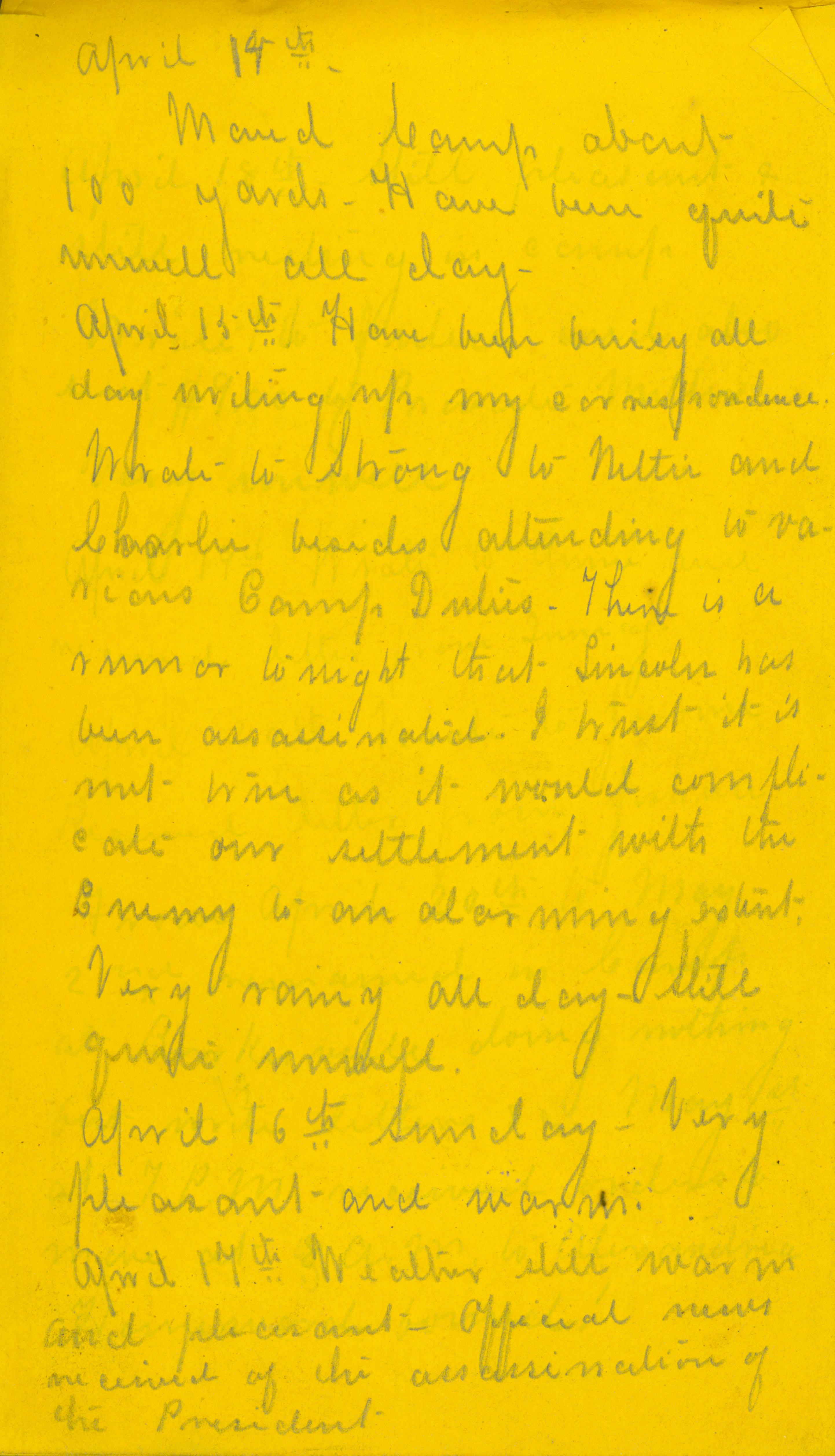
-
Description
Amos Madden Thayer was born October 10, 1841, in Chautauqua County, New York. Soon after his graduation from college in 1862, he was commissioned 2nd lieutenant of Company D, 112th New York Infantry. He later transferred to the United States Signal Corps, where he served as 1st lieutenant until the close of the war. Following the war he moved to St. Louis, where he passed the bar and later spent several years as a judge. He died April 24, 1905, in St. Louis.
Includes brief accounts of movements and military operations during the Appomattox Campaign; account of march from Burneville, Virginia, to Washington, D.C.; and final messages that Thayer sent and received, which passed between Generals Meade and Humphreys on April 9, 1865, during the Battle of Sailor's Creek. Also includes letterbook of correspondence from Thayer's law practice in Saint Louis, 1866-1876.
-
Source
Missouri History Museum
-
Rights
This item is in the public domain.
-
Creator
Thayer, Amos Madden, 1841-1905
-
Date
April 14, 1865
from Jan. 1, 1907
Alice Strickler Keyes diary entry
-
Full Title
Alice Strickler Keyes diary entry
-
Description
Alice Strickler Keyes eyewitness account of the day that Lincoln’s funeral train stopped in Columbus, Ohio, on its way to Springfield, Illinois, where the remains of the president and those of his son Willie would be buried. This account is an excerpt from the Alice Strickler Keyes diary passage in the Altrurian Club of Columbus, Ohio President's Book.
-
Transcription
[Page 1]
25
These grounds, at the head of State street, it was so far from the town and in such a swampy and unimproved district, that it too was dubbed “Swayne’s Folly.” Noah Swayne became most widely known as Justice of the Supreme Court of the United States.
His home at the head of State street was later occupied by J. Ewing Miller. Its site is now that of the Carnegie Library.
Before the “Insane Asylum” burned, the terminus of all our walks eastward, was the great flat boulder, that still lies on the sidewalk in the east Broad street, east of Jefferson Avenue.
A little farther east the Asylum Grounds ended, and not far beyond, lay “Riley’s Woods,” and the open country.
In April, 1865, Columbus with the rest of The Nation was celebrating the “Fall of Fort Sumpter,” the surrender of General Lee, and the End of the “Civil War.” There was great rejoicing.
April 14th was appointed by Governor Brough as a day of thanksgiving. On that day there were services in the churches in the morning;—in the afternoon
[Page 2]
26
and evening everything was done that is possible on such occasions to express the joy of the citizens. The town was lavishly decorated.
The next morning, April 15th all this joy was turned to sorrow when the news of President Lincoln’s assassination reached the city. The emblems of Victory gave place to those of mourning for the fallen Chief.
It was learned a few days later, that the funeral train on its way to Springfield, Illinois, would stop in Columbus, and that the body of the President would lie in state for one day, in the Rotunda of the Capitol.
At school we were told that the city Fire Department would be in the procession to meet the train at the station, and that a number of young girls, dressed in deep mourning were wanted—one to stand beside each driver on the fire engines, and many others to ride on the large “Hook and Ladder” wagon, reconstructed for the occasion.
[Page 3]
27
This plan was carried out. Forty-two school girls of varying ages, of whom I was one, rode on this car, massed around one of our teachers (Miss Sarah Smith) who was heavily draped in black and represented “Columbia.”
After the coffin of President Lincoln was placed on the splendid funeral car, the procession started back on its route through the streets of the city.
At intervals the black robed girls on the float, led by their teacher, sang verses from dirge-like hymns.
When the procession stopped at the gate of the Capitol, these girls left their float and were led into the building, and past the coffin of the President. It is said over fifty thousand people viewed “the remains” that day.
The catalogue used to carry the body of President Lincoln had a canopy shaped like a pagoda. It was large, covered with black cloth, festooned, and trimmed with silver fringe. It was drawn by six white horses with large black plumes on their heads. The horses had a covering of black cloth edged with silver fringe, and each horse was led by a groom dressed in black.
[Page 4]
28
The silver fringe used to trim the funeral car of President Lincoln in Columbus, was afterward turned over to women of one of the church societies, to make into souvenirs to be sold, and I was able to secure a piece of it.
The historian of the “Altrurian Club” (Mrs. Cope) has asked for a small portion of the fringe to be attached to this record of my recollections, and I am happy to give this tiny, precious relic to “Altrurian Club,” of which I am a charter member, and through all the years of its existence, without a break, a constant and loyal member.
Alice S. Keyes
(Mrs. Elias A. Keyes.)
[piece of silver fringe attached]
[Transcription by McCaela Michas]
-
Source
-
Rights
Use of this item for research, teaching, and private study is permitted with proper citation and attribution, as Courtesy of the Ohio History Connection, Abraham Lincoln Presidential Collection . Reproduction of this item for publication, broadcast, or commercial use requires written permission. For permission, please see this web page.
-
Tags
-
Cite this Item
Keyes, Alice Strickler. "Alice Strickler Keyes diary entry". Remembering Lincoln. Web. Accessed July 7, 2025. https://rememberinglincoln.fords.org/node/282
from Jan. 1, 1907
Alice Strickler Keyes diary entry
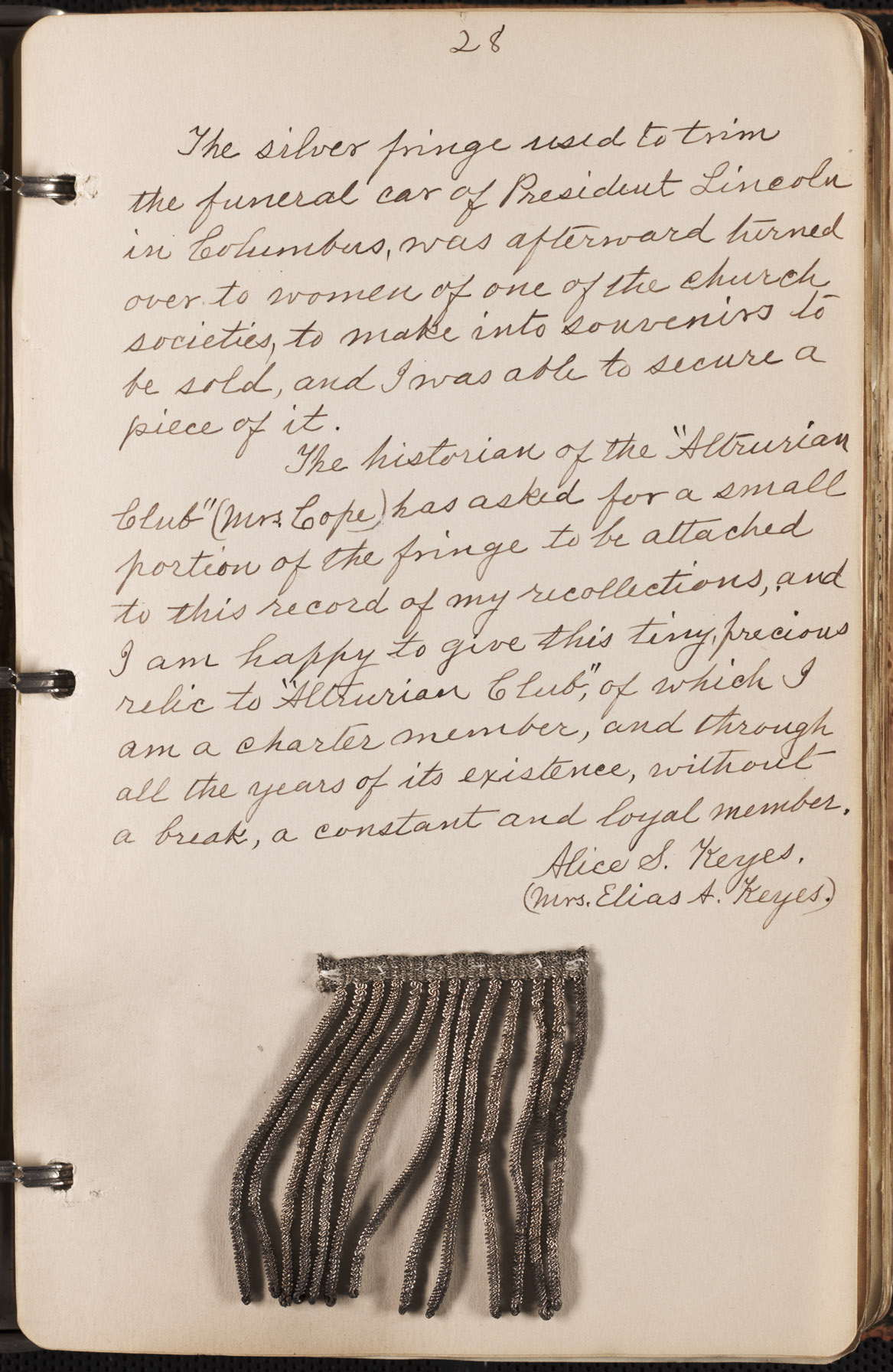
-
Description
Alice Strickler Keyes eyewitness account of the day that Lincoln’s funeral train stopped in Columbus, Ohio, on its way to Springfield, Illinois, where the remains of the president and those of his son Willie would be buried. This account is an excerpt from the Alice Strickler Keyes diary passage in the Altrurian Club of Columbus, Ohio President's Book.
-
Source
-
Rights
Use of this item for research, teaching, and private study is permitted with proper citation and attribution, as Courtesy of the Ohio History Connection, Abraham Lincoln Presidential Collection . Reproduction of this item for publication, broadcast, or commercial use requires written permission. For permission, please see this web page.
-
Creator
Keyes, Alice Strickler
-
Date
January 1, 1907


